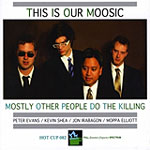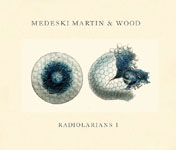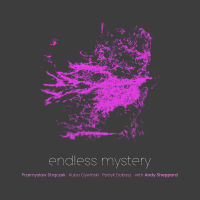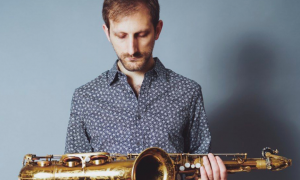Home » Jazz Articles » Interview » Greg Nagy: Our Time Has Come
Greg Nagy: Our Time Has Come
Feels good to make a record and have others listen to it. I love making records. I love sharing the music. Took me a while to get here, but sure glad I came.
 Root Doctor had its humble beginnings in Lansing, Michigan's fertile open mic scene. Freddie Cunningham (lead vocals) and James Williams (bass, vocals) first played together as a pick-up band, but both instantly recognized their chemistry and Root Doctor was soon born.
Root Doctor had its humble beginnings in Lansing, Michigan's fertile open mic scene. Freddie Cunningham (lead vocals) and James Williams (bass, vocals) first played together as a pick-up band, but both instantly recognized their chemistry and Root Doctor was soon born.Root Doctor continues to amaze audiences and wow critics. Playing a diverse mix of classic soul and R&B, alongside traditional blues and inspired original material. Root Doctor's Been A Long Time Coming (Big O, 2005), catapulted the band into the Top 25 on the Living Blues charts for three months and received critical acclaim from the blues press.
Lead guitarist Greg Nagy, considered an exceptionally soulful and creative blues player, has shared the bill and stage with such luminaries as John Mayall, Taj Mahal, Macy Gray, G.E. Smith, Eddie Clearwater, Larry McCray, Ronnie Earl, Teddy Morgan, and W.C. Clark.
A strong vocalist as well, Nagy fronted his own bands in the '90s throughout the Midwest. As inspiring as that scene was, Greg moved back to Michigan a few years ago to join Root Doctor.
Nagy's writing and production skills have been immensely important to Root Doctor's growth. It was only with his prodding and commitment that the band went into the studio in 2005 to record Been A Long Time Coming, its first ever studio record.
All About Jazz: How long has Root Doctor been together? How did the original members of Root Doctor come together?
Greg Nagy: Root Doctor started over 18 years ago when James Williams (bass) and Freddie Cunningham (vocals) met at an open mic in Lansing MI. They are the founding members and still in the band.
AAJ: Over the years Root Doctor has been through several member changes. Can you share how the band has evolved since its earliest inception, and how many members it has had?
GN:The band was a really fun party band early on, and quickly became a very popular bar band in Michigan. Scott Allman was the first guitarist and was (and still is) a blues radio disc jockey in Lansing. You can hear him on Sunday eves on WMMQ in Lansing. He continues to be very supportive of the band, even though he left about eight years ago.
AAJ: How did you come to play with Root Doctor? How long have you played with them?
GN: I am the third guitarist for Root Doctor. Considering that the band has been together for 18 years, I guess that isn't too bad. I've been in the band for three years. When I was asked to join I told them on one condition; the band releases a studio record.
We went in four months after I joined the band and did Been A Long Time Coming.
AAJ: What is your personal musical background?
GN : I am 45. I started playing when I was 14, but music has been a circuitous route for me. Eventually, I settled in in '93. I dropped out of a PhD program in Sociology to play music for a living then. I have fronted several different bands of my own, and worked as a sideman for groups such as Acme Jam, Roberta Bradley and Gypsy, and some others.
AAJ: Give us some background on each member of the band, something that can't be found on the Root Doctor website.
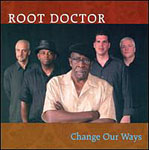 GN: Jim is wanted in three states. I'm joking of course. Man, oh I know, James Williams tells a great story of how he first realized his brother was "big-time" in the music world. He wasn't familiar with his brother's band, but his older brother Lamar invited him out to see his group. James was floored at how many people were at the concert, and at how crazy they were going-over the bands. That band was the Allman Brothers in 1973. James' brother was the bassist for the group during those years
GN: Jim is wanted in three states. I'm joking of course. Man, oh I know, James Williams tells a great story of how he first realized his brother was "big-time" in the music world. He wasn't familiar with his brother's band, but his older brother Lamar invited him out to see his group. James was floored at how many people were at the concert, and at how crazy they were going-over the bands. That band was the Allman Brothers in 1973. James' brother was the bassist for the group during those years Fred. What can I say about Fred...well he is probably one of the sweetest guys you'll ever meet. I've tried to piss him off on several occasions, but it ain't easy. But seriously, he is a very cool cat with no ego whatsoever. I did see him get after somebody once for messing with his mic (those things ain't cheap), but I would have likely done worse.
Rick Bole, our drummer, is leaving the band and music performance for personal reasons on the home front in just a few short weeks. We have a replacement who will also bring some unique gifts to the band (and he sings like a bird), but I will miss Rick. Aside from working with Duke Tumatoe for years, he has been courted by some heavies in the blues and rock world. John Fogerty loved Rick's playing. And for a while there Walter Trout was very much interested in Rick.
Me? I've been a college instructor, a Military Police officer, general's driver, door man in a large Flint nightclub in the early days, and all sorts of other things, but music is what keeps me going. That and my family, I feel very fortunate indeed.
AAJ: You guys cover the Roy Hytower tune "Root Doctor" on the group's latest CD, Change Our Ways (Big O, 2006). This one track, incidentally, is worth the price of admission, and you offer a full ten tracks on this CD. Is it from this tune that the band takes its name?
GN: Is Roy asking? I read somewhere that The Rolling Stones denied getting their name from that Muddy tune....what's the right answer here? [laughs]. Yes, I believe the band got their name from that song. Though James and Fred recall it differently at different times.
AAJ: One of the truly remarkable things regarding Root Doctor's sound is the way each member of the band contributes to the total sound without any one member usurping the others efforts, without any one member stepping on the others lines or showboating. This is truly the sign of team work. Can you describe Root Doctor's practice sessions?
GN: What's practice? We rarely rehearse unless we have a recording session coming up, or if we wish to add something new that is involved with vocal harmonies. Our sound? No egos and big ears. We really feed off of each other, and truly listen. Many bands try to out-volume each other. We are kind of figuratively dancing, reflecting, supporting, and cooperating up there, when it is going right. Steve over at Chord On Blues in Chicago seemed really taken with us. He said, "You guys are a real band." We pride ourselves in that.
AAJ: Another thing is the remarkable harmonies you guys share on these tracks. Was an ability to sing and sing in harmony with the other members of the band a pre-requisite, as each new member entered the band?
GN: The first guitarist didn't sing at all. The second, Steve Frarey, brought a developed sense of harmony and some strong vocal ability to the table. I think that is when things started to move in that direction. I believe they thought it was a bonus when I came in as a vocalist and guitarist.
AAJ: How long had Root Doctor played together before the band achieved the sound it has today? Do the individual personalities of Root Doctor mesh as well when not playing?
GN: It has been reported by a few that, before I joined the band, it was more of a bar band. Nothing wrong with that at all, but when I came in and insisted on recording and writing original material, things started to change. I think the recording process got everyone listening harder to each other. Writing built some confidence. As co-producer and one of the principal writers for the two records, I have to say that I am very proud of my fellow musicians and friends.
AAJ: Jim Alfredson, your organist, has contributed a large number of tracks to both albums. How does he introduce a new song, or are they in fact a group effort?
GN: Jim brought three songs, two on one album, one on the other, in from the outside. Great tunes. He is a talented cat on so many levels. He and I co-wrote several between the two. Each song is really different. The songs I have writing credit on I pretty did the lyrics and most if not all of the melody. Jim and I often go back and forth on arrangements. We come from different backgrounds as I am more deeply steeped in the blues, and he has his jazz thing. But we work so well together that we compromise out a nice blend of influence. He has also become one of my dearest friends ever.
Oh, also, when somebody suggests a line that really takes the song up a notch, they get writing credit with this group. Fred is a master of melody and he can really tweak my concepts too. So, in many ways this is a team effort. James and Rick lay a solid bed for all of these ideas to develop.
AAJ: How are the tracks Root Doctor will perform chosen for the CD? For performance?
GN: If they sound good on the gig, they will likely make it on the record. Though, I will say with this last record there were some songs that were musical moments created in the studio." Lucky One," "Change Our Ways" and "Wish It Would Rain" were never performed before, I think there were a few others too.
AAJ: Whose idea was it to bring the strings in on "Wish it Would Rain," the closing track of Change Our Ways? It's an incredibly emotionally charged track, and the strings really add to it. Who does the string work on this track?
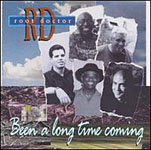 GN: Jim said Fred wanted to do the tune first off. So I told him, it has to have that vibe Mississippi blues had on the last one. Slow, sparse, etc...Nice break in the programming of the material. I was thinking that it would get placed in the middle of the record. Also thought it would be not as creative to try to mimic The Temps. After all, they did so dang well with it!
GN: Jim said Fred wanted to do the tune first off. So I told him, it has to have that vibe Mississippi blues had on the last one. Slow, sparse, etc...Nice break in the programming of the material. I was thinking that it would get placed in the middle of the record. Also thought it would be not as creative to try to mimic The Temps. After all, they did so dang well with it! Anyhow, at the time I was listening to a lot of Holmes Brothers stuff. I told Jimmy that we should make it a slow dirge, gospel number and I was hearing maybe an upright bass. Jim got hugely inspired when he sat down at the piano as it reminded him of his mom who passed away from cancer just a few years ago. I believe they had a very similar sounding church piano in their farm house in Mason.
Anyhow, that was the one song that I was not present for...not sure what happened, but it was, in my opinion, one of those musical moments you can wait a lifetime for trying to create.
When Jim emailed me the track, I cried. It floored me, I'll admit it. Jim had the middle set up for some kind of solo, and then he created that wonderful counter-melody. Glenn, Jim, and I all tweaked it a bit, but honestly the heart and solo of that number is all Jim and Fred. Glenn said he had goose bumps while tracking that. And he has over 500 albums credits to his name, so I think that is saying something.
The string players are local musicians to Flint and Lansing. I believe they play in the Flint Symphony. I was there for the tracking of the strings. That was awesome.
AAJ: You are personally putting together a live CD based on tracks taken from a gig Root Doctor did last fall. Is this the Live from the Cadillac Club, for which Root Doctor has video on its website? When will this live CD be released?
GN: We have two different shows at the Cadillac Club on tape. The most recent has some songs with Bob Seger's horn section from his Face the Promise Tour; The Motor City Horns. We are still checking out the audio. We had some technical equipment issues with the first show and worked those bugs out fairly well for the second. I am hoping we release something this summer. Maybe a best of, between the two shows.
AAJ: Who does the video work on your videos?
GN: Contemporary Media Works in Ann Arbor. Great bunch of guys.
AAJ: Where was Freddie during the filming of "Hip Hug Her"?
GN: [He was] flirting with the ladies. I am joking of course. We do an instrumental or two each night. Jim and I each sing a couple of songs now and again too.
AAJ: Your organist Jim Alfredson, has his own thing going with a self founded record label that supports his efforts. You are also working on a solo release of your own. Will the other members of the band eventually pursue their own things? Do you feel that this makes the band tighter, or do these individual efforts weaken the fabric of the band? Certainly as tight as the band is, you aren't experiencing internal problems among the band members.
GN: Some of us are full-time musicians. Fred is comfortably retired, and James works for M.S.U. [Michigan State University]. They don't mind having time off now and again, so it makes working part-time side projects easy for Jim and I. Also, they are both very supportive of our other projects. We take great care in making sure they do not clash though, of course, now and again they do. At some point one of us may go on to other things, but Fred and James are very cool about it all. They are kind of big brotherly with Jim and I in that regard.
The band really is like a family and we wish each other the best. Right now Root Doctor is a priority. But Jim and I have the time to do these side projects. We also have a side project called The James Brothers which is kind of a cross between Organissimo (Jim's jazz trio) and Root Doctor.
AAJ: Tell us about your solo release. What are you doing on this release that you cannot do with the band?
 GN: Electric Tuba! OK, not really. I could do some of these tunes with RD, and still may.But I have more than enough material that I've written that seems better suited for me to sing and perform, enough for at least a record this year. So the band has been pushing me along to go for it. In fact, I will use the fellas on all of it, I believe.
GN: Electric Tuba! OK, not really. I could do some of these tunes with RD, and still may.But I have more than enough material that I've written that seems better suited for me to sing and perform, enough for at least a record this year. So the band has been pushing me along to go for it. In fact, I will use the fellas on all of it, I believe. My friend Tad Robinson has also offered his services on a track or too. It will likely be more guitar-istic and will have some more raw blues on it to boot. My friend Dick Shurman has giving me some inspiration to pursue a funky, jazzy, whatever comes, blues thing. I got to give it a shot. Fred and I also talk about doing an acoustic album. So who knows? We've got a nice collective going on.
AAJ: Root Doctor was recently nominated for an award for the BMAs [Blues Music Awards]. This is not the first award for which Root Doctor has been nominated. Other than what appears endless glowingly positive reviews, something Root Doctor genuinely deserves, what other recognition has the band received
GN: Man, just got a nice review in April's [2008] Down Beat. That's cool. Nominated for a Blues Music Award for Best Soul Blues. We are up against my friend Tad Robinson and The Holmes Brothers though...so I am not holding my breath on that one.
AAJ: Has Root Doctor yet participated in the International Blues Challenge?
GN: We can't now, as we have been nominated for a BMA. And Root Doctor never really considered it as the band has always been busy and happy with its gigs. I believe the IBC should be for emerging artists. Root Doctor has been established and on its own terms for quite some time now. Hats off to the cats who brave that whole system though. It's a tough business, and if it works for them, I say go for it.
AAJ: What one thing does Root Doctor wish to do as a band that will really give it a feeling of accomplishment?
GN: Man, I shouldn't be telling you this, but Joe Cocker's former music director is also friends with James and thinks that the record has Grammy nomination potential. That would be huge. Not holding out too much hope for that one, but when someone of CJ Vanston's connections and influence makes that sort of statement it does feel good. He has worked with everyone man; Clapton, Mayer, Spinal Tap, really, he is there music director now. Maybe he was just talking, but it still plants a seed I guess.
On a more grounded level, I think that if we can sell enough copies to make another record then we will all be very happy. Feels good to make a record and have others listen to it. I love making records. I love sharing the music. Took me a while to get here, but sure glad I came.
Selected Discography
Root Doctor, Change Our Ways (Big O Records, 2006)
Root Doctor, Been A Long Time Coming (Big O Records, 2005)
PhotoCredits
Top Photo:Dianne Bruce Dunklau
Bottom Photo:Courtesy of Root Doctor Band
Tags
PREVIOUS / NEXT
Support All About Jazz
 All About Jazz has been a pillar of jazz since 1995, championing it as an art form and, more importantly, supporting the musicians who make it. Our enduring commitment has made "AAJ" one of the most culturally important websites of its kind, read by hundreds of thousands of fans, musicians and industry figures every month.
All About Jazz has been a pillar of jazz since 1995, championing it as an art form and, more importantly, supporting the musicians who make it. Our enduring commitment has made "AAJ" one of the most culturally important websites of its kind, read by hundreds of thousands of fans, musicians and industry figures every month.

